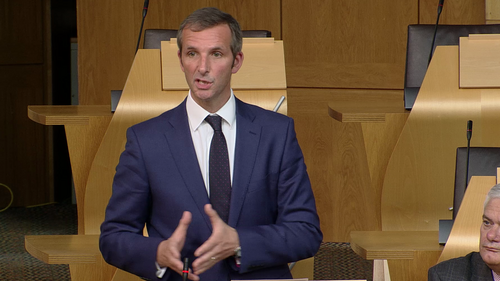Assisted Dying: average cost of journey to Switzerland for an assisted death rises by £5000

The average cost of travelling abroad for an assisted death in Switzerland has increased by a staggering 50% in the past 5 years. This option is out of reach for the majority of dying Scots.
A new report ‘Time for Choice the truth about Scotland’s ban on assisted dying and how things could be better’ by Dignity in Dying Scotland, reveals that the average cost for a terminally ill person who decides to travel to Switzerland to end their suffering now sits at £15,000 – a rise of £5,000 since 2018. Research commissioned by Dignity in Dying Scotland reveals that this cost would be unaffordable for 68% of Scots, should they need it.
The report’s findings add weight to the evidence supporting Liam McArthur MSP’s Assisted Dying for Terminally Ill Adults Scotland Bill which would end the current blanket ban on assisted dying and grant terminally ill, mentally competent adults in Scotland the right to a safeguarded and compassionate assisted death if they choose.
Almost 8 out of 10 Scots say they would support the introduction of such a law, with 79% of disabled Scots and 73% of Church of Scotland members in favour.
Ally Thomson, Director of Dignity in Dying Scotland, said:
“These findings are essential reading for MSPs who will vote on Liam McArthur MSP’s Assisted Dying Bill. When almost 60% of us have known a loved one suffer at the end of life we desperately need the law to change. With the majority of Scots from all walks of life in favour of legalising assisted dying, the public are calling out for their MSPs to vote in favour. With rising costs putting travelling to Switzerland for an assisted death even further out of the reach of ordinary Scots, Switzerland can no longer be used as a sticking plaster by lawmakers reluctant to challenge the status quo here despite it being an arduous journey which only a privileged few could afford.”
“The evidence is overwhelming that the current blanket ban forces dying people to make increasingly desperate decisions. There is nothing compassionate, safe, transparent or regulated about dying people taking matters into their own hands or trying desperately to scrape together £15,000 to have a peaceful death abroad. This suffering is a reality for dying Scots right now and I call on MSPs to listen to what the majority of us want, what terminally ill people are telling us they need and vote to consign these harms to history.”
Stacey Young who’s mum Zena Miller, from East Lothian, was diagnosed with a rare and aggressive bile duct cancer in 2021 said:
“My mum received fantastic palliative care at home, then in the hospital where she had worked. But it wasn’t able to control all her pain and she endured extreme suffering as she died.”
“Mum was extremely strong-willed and fiercely independent. Two weeks before her death, she said she was ready to go. None of us could have anticipated the suffering, indignity and inhumanity she would endure. For six days she was unable to move or communicate, yet remained conscious. She effectively starved to death. She was skeletal in appearance, literally unrecognisable. My dad and I have PTSD from what we witnessed. I know for certain she would have chosen an assisted death. I wish she had dignity, comfort, and choice. I wish she could have said a proper goodbye”.
Liam McArthur MSP said:
“While I welcome the report’s findings and their contribution to the evidence that backs my Members Bill, I am greatly concerned about the situation on the ground for dying people facing a bad death. The evidence uncovered as regards the extent of suffering and what the lack of a safeguarded assisted dying law is driving terminally ill Scots to consider is in line with the experiences that people from all across Scotland are getting in touch to tell me about. Every single experience I hear hardens my resolve to get this law changed. We know that excellent palliative care is the right path for the majority of dying people but for those who need more choice –right now they are being failed by a bad law.”
“I am particularly struck by the fact that support for my proposals is so high amongst disabled Scots and those who attend the Church of Scotland. I think this is significant in light of some of the concerns that have been raised in the context of the debate about my proposals. In truth, we know that the evidence shows that tightly safeguarded and compassionate assisted dying laws work not only in giving dying people what they need but in providing protections for all groups as well.”